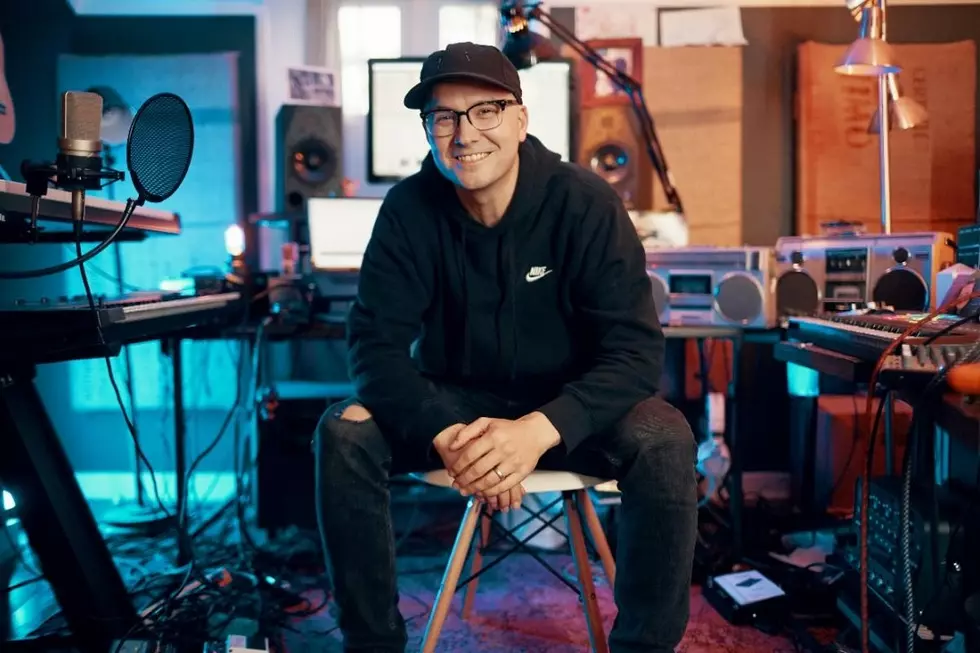
Interview: Hit Songwriter Luke Laird Aims for Total Honesty on New ‘Music Row’ Album
It's a country music cliche to say it's the song that matters most, but for Luke Laird, that's been the case from the very start of his dreams of a career in the industry.
As a child in rural Hartstown, Pa., Laird "was just into whatever was on the radio, so I was a huge Michael Jackson fan," the now-hit country songwriter recalls. His parents listened to their local country station, but it wasn't until a young Laird went with his aunt and uncle to see an early-career Randy Travis at the Crawford County Fair that he really began paying attention to the genre.
"I was just totally captivated, and I just fell in love with it," Laird tells The Boot via phone from his Nashville home. He grew up on a dirt road, in a house next to his grandparents' farm, so "there was a lot of lyrics in country music that I could really relate to," he notes, "and I was all in from that moment on."
Laird was in high school and a budding guitarist when a family trip to Nashville laid his career aspirations out in front of him. "I was just like, 'I can't believe a place like this exists,'" he remembers thinking, especially when he and his family went to an intimate, in-the-round songwriters' showcase at the Bluebird Cafe. Tony Arata (Garth Brooks' "The Dance") was on the bill, as Laird sings about in the title track of his new album, Music Row, along with Fred Knobloch; Laird can't remember who else he saw that night, but he got all their autographs after the show.
"I knew there were songwriters, but to actually see them as real people ... it was amazing. From that moment on, I would look up every single songwriter; I wanted to know who wrote what," Laird says, and he'd "play detective" and figure out songwriters' catalogs.
"My mind and my heart were made up that I wanted to move here and do that," he continues. "It was kind of intimidating, but very inspiring all at the same time."
Laird has been at it for about two decades now. As a songwriter, he's earned 24 No. 1 hits and a number of ACM, CMA and Grammy Awards; he's also a BMI Songwriter of the Year winner. Music Row, which dropped on Friday (Sept. 18), is his first time releasing something as an artist, however.
Encouraged by his wife, Beth Mason Laird, with whom he co-founded the publishing and management company Creative Nation in 2011, Luke culled together a set of 10 hyper-personal songs "from an actual working songwriter's point of view." "Good Friends" and "Jake and Mack," respectively, name-drop specific buddies and the Lairds' two sons; "Leaves on the Ground" is for Laird's best friend from high school.
"I think sometimes when you write from a very personal place, everybody has these emotions and feelings, and I may put specific names to them, but somebody else, as they're listening, will probably think of their friends," Laird explains. "That's what I hope to do with these songs. It's a lot more enjoyable for the listener if they can relate."
"That's Why I Don't Drink Anymore," meanwhile, begins with a confession from Laird: a spoken-word recollection about the moment he decided to get sober and acknowledge his faith. "It's a little clunky," he admits, "but that was the very first thing that came out ... I felt like it was the most honest."
The song's verses focus on the reasons Laird got sober: his wife and sons, their satisfyingly full life, his memories of his grandfather wrestling with alcoholism and his own struggles with the disease. "By the grace of God / I'm waking up at home 'stead of passing out in a parking lot ... Don't matter how hard some days can be / I am found and I am free / What else do I need?" he sings in the chorus.
"I realized at 27 ... that I had a serious issue with alcohol," Laird reflects. "It's like I was meant to be a country songwriter," he adds wryly.
As a whole, Music Row is intentionally low-fi, largely recorded by Laird alone and mixed by Bill Bottrell, the producer behind Sheryl Crow's now-classic debut album, Tuesday Night Music Club, one of Laird's favorites. Bottrell lives in the middle of nowhere in California, and after Laird cold-emailed him to ask to work together, the two sent Laird's hard drives back and forth to complete the project.
"I knew I wasn't having to shoot for country radio, which is very freeing," Laird explains of the record's demo-like style. "I always thought [Bottrell's production] sounded very in the moment and not too polished, but still good."
It's the perfect style for an album by someone who was drawn to his career path because of how "normal" songwriters seemed.
"Still, I'll be out in Nashville and run into Don Schlitz," Laird says, making an example of the "The Gambler" writer and continuing with a laugh, "He's literally in the Country Music Hall of Fame and it's like, 'Oh man, they eat at Applebee's too.'"
More From TheBoot









